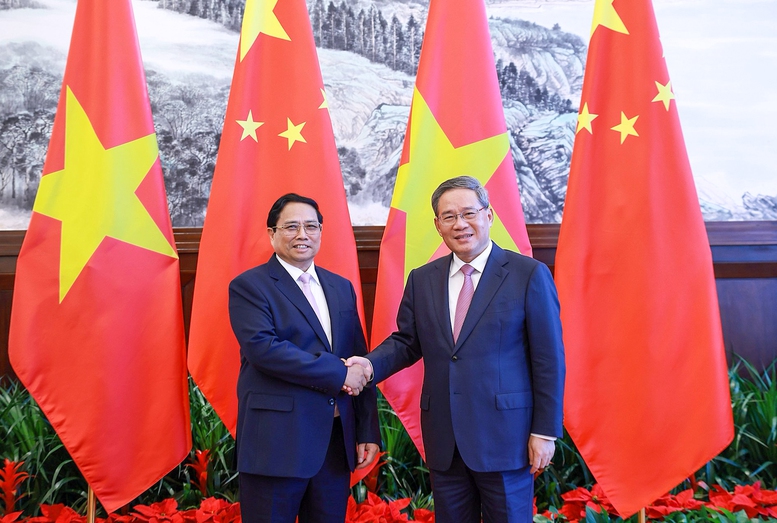Digitalization, green growth among key focuses in Vietnam-China cooperation
China regards Vietnam as a priority in its overall neighborhood diplomacy, supporting the country’s successful industrialization, modernization, and expansion of its international role.
Vietnam and China should strengthen their collaboration across multiple sectors, including agriculture, finance and banking, science and technology, education, culture, and tourism, with a particular focus on digital transformation, green growth, and advanced agricultural technology.
| Prime Minister Pham Minh Chinh (l) and his Chinese counterpart Li Qiang. Photo: Nhat Bac |
Prime Minister Pham Minh Chinh expressed this perspective during a meeting with his Chinese counterpart, Li Qiang, in Dalian, China, on June 24.
Prime Minister Chinh is visiting the neighboring country from June 24-27 to attend the World Economic Forum’s 15th Annual Meeting of the New Champions.
During the meeting, the two Prime Ministers agreed that the relationship between the two Parties and countries has made historic strides, achieving numerous significant milestones. These include strengthened political trust, the establishment of new cooperation mechanisms in important fields, accelerated strategic connectivity, especially in transportation, robust growth in trade cooperation, a surge in Chinese investment in Vietnam, a strong recovery in tourism, and vibrant local cooperation and people-to-people exchanges.
Prime Minister Chinh reiterated that Vietnam regards the development of relations with China as an objective necessity, a strategic choice, and a top priority in its independent, self-reliant, multilateral, and diversified foreign policy. Meanwhile, Prime Minister Li Qiang emphasized that China always considers Vietnam a priority in its overall neighborhood diplomacy, supporting Vietnam's successful industrialization, modernization, and expansion of its international role.
The two sides agreed to effectively implement the Vietnam-China Joint Statement on further deepening and elevating their Comprehensive Strategic Cooperative Partnership, building a Vietnam-China Community of shared future with strategic significance in the "6 more" direction.
The two government leaders pledged to maintain high-level exchanges and contacts at all levels, strengthen cooperation through Party channels between the two governments, parliaments, and national fronts; expand cooperation in key areas such as diplomacy, defense, and security; enhance practical cooperation in various fields and friendly exchanges between localities and peoples; build a peaceful, stable, cooperative, and developing land border; effectively manage differences and maintain peace and stability at sea; and strengthen coordination in international and regional forums.
Chinh stressed the need for both sides to continuously innovate, find creative solutions, and resolutely implement shared high-level understandings and agreements. He called for accelerating strategic connectivity, particularly in infrastructure, such as studying the construction of standard-gauge railway lines connecting Lao Cai-Hanoi-Haiphong, Lang Son-Hanoi, and Mong Cai-Ha Long-Haiphong.
He urged the signing of protocols and completion of procedures to open the market for Vietnam's frozen durian and fresh coconut, expedite market access for other agricultural products, and facilitate the establishment of Vietnamese trade promotion offices in Chengdu, Haikou, and Nanjing. He also called for measures to improve customs efficiency, upgrade border infrastructure, and promote the development of smart border gates; solve issues in some cooperative projects, and speed up the implementation of China's non-refundable aid to Vietnam.
Chinh suggested drawing up a plan for the official operation of the Ban Gioc (Vietnam) - Detian (China) Waterfall Scenic Area; and called on China to provide 1,000 scholarships for Vietnamese Chinese language teachers.
Prime Minister Li Qiang agreed and appreciated Chinh's cooperation proposals, reaffirming China's willingness to deepen substantial cooperation and promote the development of the Vietnam-China Comprehensive Strategic Cooperative Partnership in line with the "6 more" direction.
He announced that China will further open its market to Vietnamese goods, especially high-quality agricultural and aquatic products, and facilitate quarantine and customs clearance. China is also willing to address institutional and policy obstacles to ensure sustainable and fruitful bilateral trade growth.
Li suggested that the two sides enhance strategic connectivity, especially in infrastructure and transportation; promote trade and investment cooperation, especially in manufacturing, agriculture, supply chain, and vocational training; expand financial and monetary cooperation; and make substantive cooperation between the two countries increasingly effective and commensurate with the new level of their bilateral relations.
The two Prime Ministers also had a candid and sincere exchange on maritime issues, agreeing on the importance of adequately managing differences and maintaining peace and stability in the East Sea.
Chinh called on both sides to strictly implement high-level understandings and the "Agreement on basic principles guiding the settlement of sea-related issues between Vietnam and China"; respect international law, particularly the 1982 United Nations Convention on the Law of the Sea (UNCLOS), and each other's legitimate rights and interests; effectively utilize negotiation mechanisms on maritime issues; properly handle fishermen's issues; and manage the situation at sea effectively.
They also discussed international and regional issues of mutual interest, agreeing to maintain coordination and cooperation in regional and international forums.
Chinh reaffirmed Vietnam's consistent policy of adhering to the "one China" principle and supporting China's increasingly important and positive role in the region and the world. He proposed that both sides strengthen coordination and cooperation in regional and international forums, particularly within the frameworks of the WTO, APEC, ASEM, and ASEAN.












